The Winter’s dance, a play with white, shadow, and stillness.
On the Edge of Winter in the Garden
A photo tour of what is growing at Barbolian Fields while I try to get some leaves raked up and put down for mulch, but mostly just get sidetracked!
Ecological Gardening and Other Creative Pursuits
A photo tour of what is growing at Barbolian Fields while I try to get some leaves raked up and put down for mulch, but mostly just get sidetracked!
I might not have written much on the Blog in 2021, but I took a lot of photos. The pictures tell the story of what was a very busy year! In a sense, it is a Phenology Wheel in photos – a great way to track the changing seasons and interactions in the plant and animal world. … Read more
It’s all about the soil! Build the soil and the life in it to better protect the water essential to all life. Mulch the World!
30 Things that Make Me Happy – Because we need happy things right now more than ever… so – coming to all of us in the northern hemisphere – here are some sure signs of spring!
If you are like me and some 19 million other people out there (or more), you might be experiencing Garden Overwhelm. This time of year when night equals day (more or less) is a good time to think about our own equilibrium. This post explores how to get back on track, and when all else fails, your dog just might have the answers. Happy Autumn Equinox!
Spring is almost here! Yay! But before spring clutters the garden with a bunch of leaves, take a winter garden site assessment to evaluate whether your garden is growing toward your goals. Winter allows us to see the bare bones of the garden – the skeletal infrastructure – and a site assessment at this time can give us new insights into what works and what doesn’t. Identify sectors, look at how growth over the past year may have changed conditions, think about priorities for the coming season. Hooray for spring!
It is that time again to reflect over the year’s ups and downs, an exercise that has become cliché but that can still be quite helpful. It was a busy year! Here is a quick summary of what went down (or up, as the case may be) at Barbolian Fields, along with a few goals and strategies for the coming year. What will 2019 bring? What will we be able to do to make the world a better place? How will we help one another? How will we heal our planet? We can start by getting back to the garden.
Malabar Gourd, Malabar Squash, Fig-Leaf Gourd, Pie Melon: There are many names for the Cucurbita ficifolia. No matter what you call it, this is one of the most amazing squashes EVER. Tremendously versatile – it can be used in soups, stews, goulashes, pies, puddings, beverages, and more! Every part of the plant is edible. The biomass is incredible! Join me on this Malabar Squash hunt and be prepared to be amazed!
The rest of the story… the late summer garden has turned out nothing like what I envisioned in the spring, but in some respects, is so much more. It’s hard not to get discouraged when once again, I’ve truly lost the battle against grass, thistle, and bindweed. Garden chaos rules, but neatness and control are so overrated, are they not? Here were my “Ah ha!” moments.
The bees have returned! Yay! Here’s the whole story. And with them, responsibility. Do they have enough food? Nectar is suddenly scarce when the fruits are fruiting and the flowers are done blooming. The dreaded dearth can hit a hive harder than winter. What can you plant to ensure they make it through late summer? In this post, I list the main bee plants that we have growing right now, including the bees’ favorites.
It’s another drippy day in the Pacific Northwest. What to do … or not … that is the question.
April is National Gardening Month. The blogs are full of To-Do Lists on what you should be doing if you had your act together (which is making this overachiever feel like a real slacker). What is truly feasible? How to find balance? Taking an April Garden Survey is a good procrastination technique. In this post, I explain my strategy for this year’s garden (and for minimizing my workload) and take a look around at what is up and blooming.
Walk along a soaked garden path in early March and what do you see? Raindrops, birds, insects, and the world waking up. So amazing, it drove me to write poetry. Herein a poem for March, the wondrous transformations in a garden, and the miracles of spring. They’re everywhere. If we build it, they will come.
Autumn Olive (Elaeagnus umbellata): its red speckled fruits stand out like tiny Christmas lights against the bare branches, so bright beneath the snow – such a gift in mid-December!
We turn the corner into November. It is amazing how much is still blooming and how many fruits are still available! Here is a quick autumn garden inventory. Lots of pictures of flowers, fruits, fall colors, and cute grandkids – plus an amazing bald-faced hornet’s nest that was revealed after the leaves had fallen!
The fact is, the greatest changes come from people, not from government. Now is the time to bring back the Victory Gardens of yesteryear. We can change the world, one garden at a time — together.
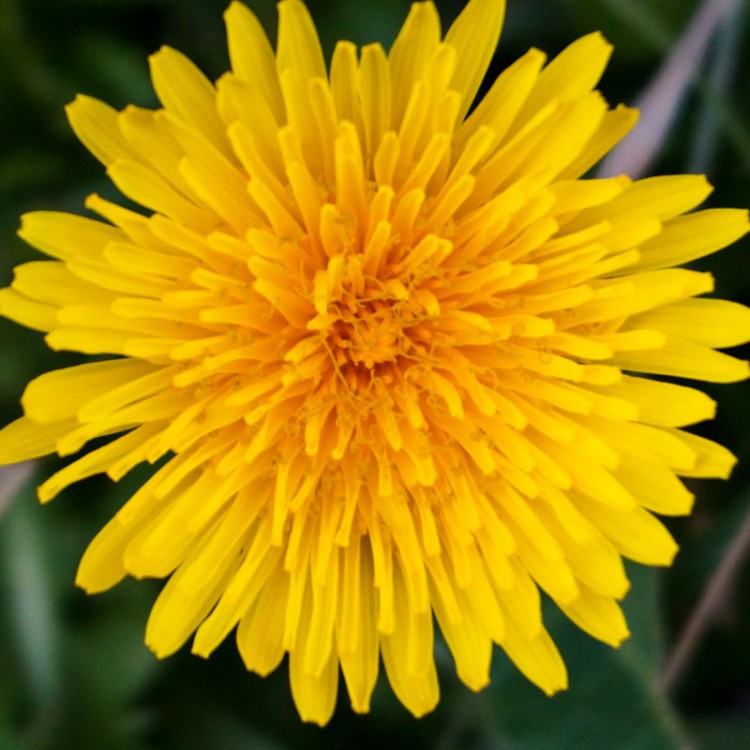
Cornelian and Nanking cherries, forsythia, daffodils, nettles and purple deadnettles, the first dandelions…
It seems that only yesterday, it was still quite wintery, and on a blustery day, I was picking the sticky cottonwood buds from the nubbly branches that break off in the wind, littering the forest floor, just begging someone to come along and recognize their significance.
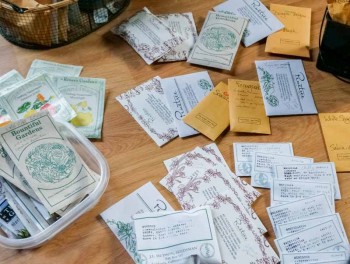
I originally wrote this post shortly after Groundhog Day, when we were just praying for a ray of sunshine and a shadow – and here we are now caught in the middle of March Madness, aka the Ides of March, which is called that for good reason. Winds have been howling at 65 mph (I kid you not) and the rain hammers us in torrents. This is how winter quickly melts into spring.
The pre-spring storms give us a bit of time to flip through all the new garden catalogs that have arrived since the beginning of the new year. It is, indeed, the perfect time to create this year’s garden vision and a concrete plan to make it happen, if you have not done so already.
So – tell me – have you placed your seed order yet?
Case in point: for those of you who read my last blogpost all the way to the end (ahm…it’s ok if you didn’t get that far; unlike so many things in life, you can always go back), I was waxing philosophically about how wonderful it is to stumble across a new plant that you don’t remember … Read more
To get your seeds to germinate, you might have to “think like a seed.” Many folks in the Pacific Northwest are starting seeds indoors this month for transplanting later, but some seeds germinate better with a period of cold or fluctuating cold/thaw cycles. They might be better planted directly in cold ground.
LOVE the “firsts” that happen in January! First crocus, alder catkins, croaking frogs! This warm weather has brought out the bees, and they are returning with pollen! And look! The garlic shoots are up! Farewell January. Bring on Spring!
Rosemary! Blooming in January! You gotta love this herb! It is a great cullinary plant, medicinal herb, insectary, and more! You gotta grow it!
Why isn’t the Winter Solstice the beginning of the New Year? Where are the birds & the bees? How many different fruits can we find in the garden in mid-December? Pondering these questions and more…and wishing everyone a season of light and hope!
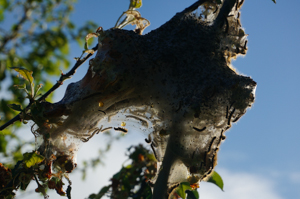 I have squished them with my bare hands, blasted the nests open with a power hose, sprayed them with vinegar, burned them alive with a blow torch, and for those that survived all that, drowned them in soapy water. If you, too, have stood aghast at the havoc they have wreaked in your beloved fruit trees, have vowed to take action, if not declare outright war, and have been somewhat taken aback by their tenacity – yes, we are talking about tent caterpillars – read on. But fair warning: this post is not for the faint of heart!
I have squished them with my bare hands, blasted the nests open with a power hose, sprayed them with vinegar, burned them alive with a blow torch, and for those that survived all that, drowned them in soapy water. If you, too, have stood aghast at the havoc they have wreaked in your beloved fruit trees, have vowed to take action, if not declare outright war, and have been somewhat taken aback by their tenacity – yes, we are talking about tent caterpillars – read on. But fair warning: this post is not for the faint of heart!
Do you keep a record of what is bloom throughout the year? Since we started providing homes for bees, I have become much more aware of what is blooming when – particularly during those months on either end of the warm season, when the weather is unsettled and food for them can be scarce.
It seems many of the first to bloom are some of our natives. Perhaps it is Nature’s way of taking care of her own.
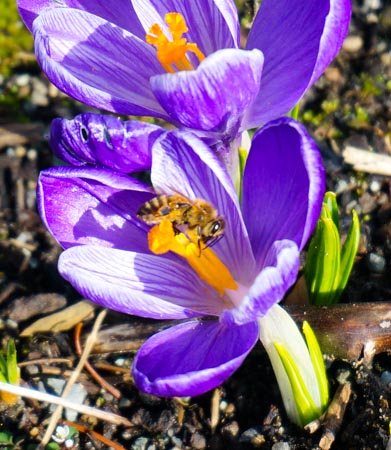 Ahhh! At last! Whether it looks like it outside or not, we are assured that warmth is on its way! We have reached that tipping point: the day of the Vernal Equinox – when day and night are held in equilibrium. Symbolically, it provides a moment to think about balance in our own lives, too – and what we might do to bring tipping scales back into alignment.
Ahhh! At last! Whether it looks like it outside or not, we are assured that warmth is on its way! We have reached that tipping point: the day of the Vernal Equinox – when day and night are held in equilibrium. Symbolically, it provides a moment to think about balance in our own lives, too – and what we might do to bring tipping scales back into alignment.
Not to worry – I won’t delve deeply into the woo-woo here.
“By now you should have a pretty good idea what you will be growing, and where you will be growing it.” That’s a quote from Erica over at Northwest Edible Life on a post about February garden tasks.
My first thought was, “Um, yeah. I’m sure that applies to most all of us, right?”

It’s Garden Planning Season, and you know what THAT means: deep introspection to determine what worked and what didn’t, because unless you incorporate what you’ve learned into this year’s garden, you will be going forth with an impending sense of doom….
The winter is not that dark. Seriously. Lighten up already!
A reader from Texas posed some very good questions relative to my recent post on the importance of building the soil and, in particular, the essential role fungi play in the process. (Read: To Convert an Orchard to a Food Forest, Start with the Soil)
Specifically – How do you differentiate between the good guys and the bad guys?
She asks, “Don’t we always seem to be spraying trees against fungus?” “What about all the mildew, fire blight, early blight, and other diseases that can take down tomatoes, squashes, and cucumbers seemingly overnight?”
Where do you start?
How do you help one without helping the other? Or the converse, destroy one without harming the other?
Can you introduce good fungi? And can good fungi fight off the bad ones?
My response started to get a bit lengthy, and I decided it would be better as its own blogpost. Maybe some of the other readers out there can shed some light on this as well.
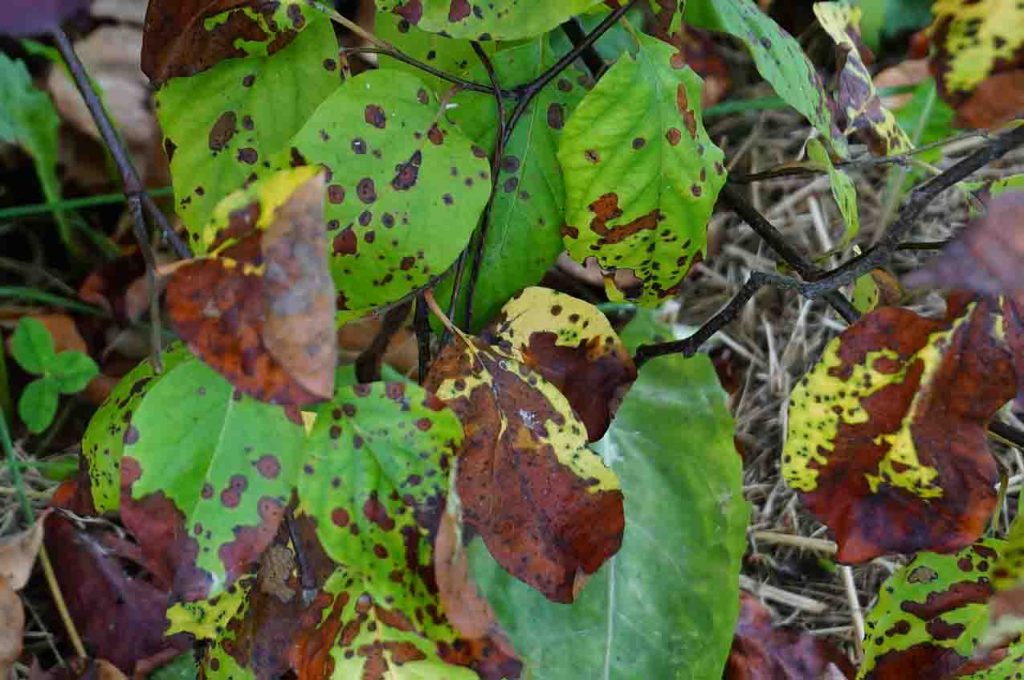
Because I couldn’t agree more on how confusing some of this is!
I thought I might write you all sooner. At the time of the last full moon of the year, for example, would have been appropriate, but the great white orb managed to boldly rise in the cold night sky and then set in quiet serenity the following morning without any website fanfare on my part (although I admit to a certain amount of cavorting in song and celebration, which is usually what happens when I whip out my harmonicas under a full moon….). (Not to draw correlations, of course.)
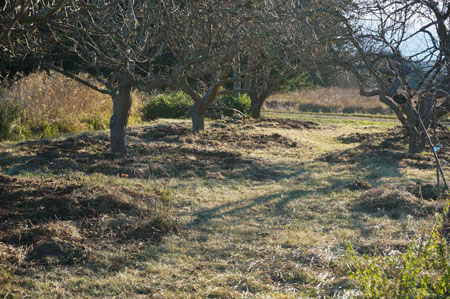 We have this old orchard on our homestead – how old is anybody’s guess. The house is over 100 years, so perhaps the trees are as well? How long do they live? It comprises 9 trees (apples, pie cherries, and an Italian prune), and despite its age, produces more than we can use, but not really enough for any kind of commercial enterprise.
We have this old orchard on our homestead – how old is anybody’s guess. The house is over 100 years, so perhaps the trees are as well? How long do they live? It comprises 9 trees (apples, pie cherries, and an Italian prune), and despite its age, produces more than we can use, but not really enough for any kind of commercial enterprise.
The trees, like a lot of neglected orchards, are fraught with a tangle of suckers and twisted branches growing contrary to common sense. Gradually we have been pruning them back into shape, opening the centers to more light, and mowing the grass around and around. We are not ones to spray copper, sulfur, and assorted pesticides; nor have we added any fertilizers. In fact, we have rarely even watered them (they have obviously survived quite well on their own thus far, being situated alongside an irrigation ditch). It has been a learning process for us, too, and sometimes there is only so much you can do. The apples have a lot of scab. Pill bugs and earwigs enjoy them a lot. I think 4 of them are heirloom Gravensteins. They taste great.
And then one day, in reading Michael Phillips’ “The Holistic Orchard – Tree Fruits and Berries the Biological Way,” I began to realize that the typical orchard, planted in rows and surrounded by grass, produces in spite of the conditions we put them in. The descriptions were painfully familiar. It struck me that with a little help, this orchard could be so much more. Toby Hemenway’s book, “Gaia’s Garden,” was another eye-opener. Obviously, there are simple things we can all do to work with Nature, rather than against her.
Thus began the mission to let Nature “reclaim” the orchard.
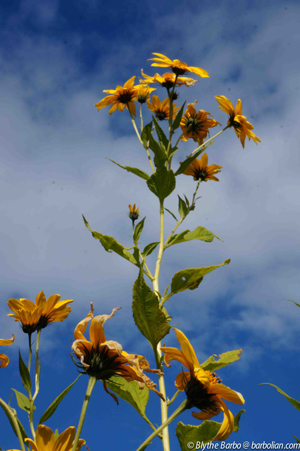 The end of November! How did this happen? It appears that we were so busy during the flurry of harvest activities and making sure things were getting tucked in before the coming chill, we forgot to look up! The days are not as long, you know; they are gone before you know it! We hardly noticed just how swiftly one turned into another while the sun skated low across the sky. What happened to high noon?
The end of November! How did this happen? It appears that we were so busy during the flurry of harvest activities and making sure things were getting tucked in before the coming chill, we forgot to look up! The days are not as long, you know; they are gone before you know it! We hardly noticed just how swiftly one turned into another while the sun skated low across the sky. What happened to high noon?
The temperatures are dipping into the 20s, and yet… such miracles! The bees are so very grateful!
I think we, too, appreciate them all the more!
On the Eve of All Hallows… when according to the ancient Celtics, we enter the dark half of the year…
…spiders cover the world with glitter…
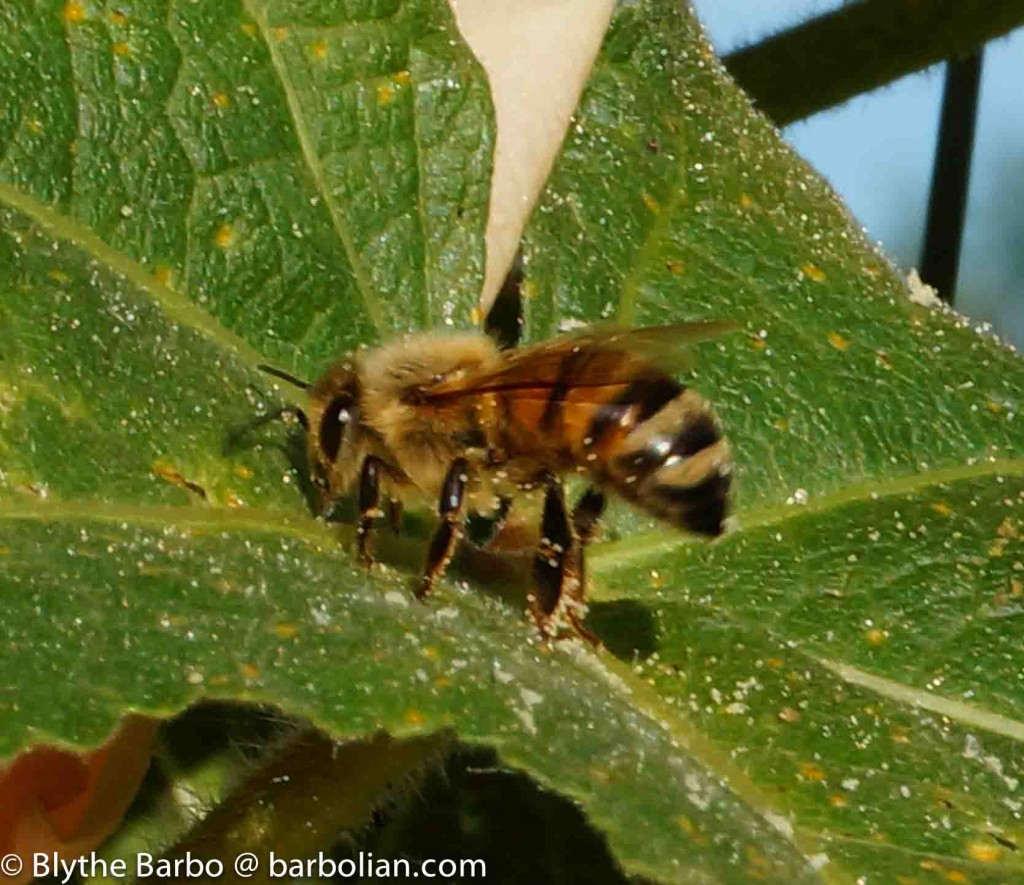
It’s a phrase that brings me back to when my teenage kids would hang for long periods on the open door of the refrigerator
As we approach late summer, I, too, have to ask, “What is there to eat – for the bees?” (And for that matter, what’s to DRINK? Are their water sources still available?)
The Willow Room in spring takes on a life of its own. Individually, the reeds are supple. They bend with the forces that shape them. Together, however, they are strong – forever interlocked. Recent events in Boston remind us how together we are stronger, and, too, how each of us needs an inner garden sanctuary in which to find peace and make sense of this world.
Ok – so the truth is, I just cannot narrow it down. I have spent days and days looking at websites of different nurseries and purveyors of exotic seeds – and I have spent months and months reading about plants and planning different guild arrangements and compiling “wish lists” that rivaled the loving letters I used to send to Santa Claus – and I, much like our dear friends (ahm) in Congress, cannot seem to reconcile the expenses with the budget. And, like them, the debate goes on and on – because my vision does not coincide with reality, which I am still trying to define, in terms of the vision, of course. It’s a loop-thing. As is life.
And so I took a break to try to put it all back together in the Willow Room, because even in winter, this is a good place to go see how things with a little creativity, intertwine. (Besides, it was time to do a little pruning.)
A list of seeds I collected last fall – and also some roots and tubers. Care to trade? Buy? Barter?
Personally, I think New Year’s resolutions are over-rated and goal-setting can be counterproductive. A To-Do list, though, Yes! Break it down into action items! Here’s what’s in store for the garden!
Frost is on the grapevine! The dill looks like a sparkling fireworks! And our friend, Toad, well, he looks like he could use a little warm sunshine!
Wow. What a transformation! Here are 12 accomplishments and lessons learned in the 2012 garden. It’s all good! And 2013 promises to be even better!
Welcome to my secret garden: the Willow Room. It didn’t start out as much – just a few twigs; but it has transformed into something truly magnificent! A place to dance and celebrate autumn!
Thinking of a “3 Sisters’ Garden”? (corn, beans, and squash together). Can you still plant corn in the Pacific Northwest? I planted June 16 last year, sort of 3-sisters’ style (sort of not). Great results! Read on!
Is it too late to plant spinach? When should you plant tender veggies? What to plant? Did you miss your planting window? Or is it just opening? These questions and more, not necessarily answered.
Before we coined the word, “Permaculture,” Nature was already perfecting it on her own. Here, Paul Gautschi describes his methods of mimicking nature by applying mulch in his garden. The results? Absolutely amazing! His approach has recently been featured in a film, “Back to Eden.” Happy International Permaculture Day!
Hooray! It’s officially spring! Days are getting longer than the night – finally! Here are some cool tools to help you track the way the sun changes with the seasons and some ideas on how to apply that info to your garden design.
Winter doldrums got you down? Beware of March Madness – when everything goes a little crazy – and not just the weather and the weeds. Indulge your compulsion to “buy more plants.” They are good for you.
A gallery of buds and blooms – the garden is waking up and it looks like it has been watered with a triple shot of caffeine! Spring is only 16 days away! Yippee!
What’s to salvage out of a garden hammered by winter storms? Italian Lacinato (or Tuscan) Kale stands strong! Here’s a great recipe for Chicken-Kale-Cauliflower casserole (with a fair amount of garlic, of course!)
Got pruning phobia? Never fear. This 5-step approach to fruit tree pruning will help you get those old apple trees back into shape in no time! (Well, maybe in a few years, anyway.)
Did you grow a giant pumpkin this year and are now wondering what to do with it? We’ve got some ideas…
We planted my mother with the dogs in the pet cemetery. It’s true. She would have wanted it that way, right next to her best friend, little Lambchop. It’s not as bad as it sounds. The cemetery, which we affectionately call “Boot Hill,” sits on a little knoll with a view of the Olympic Mountains, … Read more
If you’re looking for a really good book on permaculture, check out Toby Hemenway’s “Gaia’s Garden, A Guide to Home-scale Permaculture,” second edition. This book was life-changing for me – and could be for the world, if we would only apply it.
Want to grow more food in less space with less effort? The “All New Square Foot Gardening” by Mel Bartholomew has the approach you might be looking for. With gas headed skyward, putting away the tiller and growing what you need makes a lot of sense. 100% of the harvest at 50% of the costs, 20% of the space, 10% of the water, 5% of the seeds, and 2% of the work – that makes it a no-brainer.
Blame it on Seasonal Affective Disorder if you wish, but this is the time of year when many of us otherwise-very-reasonable people succumb to buying seeds for things we know we don’t have room for or can’t possibly grow in our zones. We need to get real. A strategy. A garden PLAN. I’ve been reading a lot of books this winter and am passing on some cool ideas – obviously, not my own. This post is an introduction.
Time to plan this year’s garden! In this post, I share a bunch of pictures of plants I grew from Renee’s Garden Seeds – things like poppies, morning glory, larkspur, yellow pole beans, beets, kohlrabi, and more. These will definitely be on my “grow again” list.
Did you make any gardening New Year’s resolutions this year? Do you have a strategy when it comes to keeping up with your garden? Last year, I used goal-setting and time-management techniques to try to get an upper hand on the weeds. My mission was to “Establish Boundaries” over which no weed should dare cross! Lesson learned: weeds do not respect my boundaries. Many things – particularly the garden – are beyond my control. This year, I’m working more from an attitude of cooperation rather than conflict. We’ll see whether Mother Nature agrees.
So many reasons why I love this simply gorgeous time of year! But aaaghhh! So much to do! …last-minute scramble to button things up for winter, can and freeze surplus produce, get the garlic in the ground, don’t forget fall cover crops…and what to do with all those apples? Try this Skillet Apple Cake Recipe – it’s fast & easy!
Hey! We are doing the Corny Happy Dance here at Barbolian Fields. YES! We are harvesting CORN! Amazing but true! Here are my 10 tried-and-true tips for growing corn in the Maritime Northwest, where summer heat can be fleeting, at best.
We’re running out of heat units here! What do I have to do to inspire this corn to get with the program? Maybe this little Gershwin Summertime tune will help, by yours truly & trusty harmonicas in Em and Am. (the livin’ ain’t so easy if you’re an ear of corn in the Pacific Northwest)
The oil still gushing out of the bottom of the ocean in the Gulf should make us all aware that we are all part of the problem. Choosing to use hand tools instead of machinery is one small way we can cut back on our consumption. In this post, I describe how I sharpened an old sickle and cut down my green manure crop of a rye-clover-vetch mix (mostly rye) by hand. Let me tell you, it made me feel pretty darn powerful! Try it. You’ll like it. And so will our environment.
Progress reports from Pennsylvania and the Mojave Desert: Barbolian garlic is thriving across the country! Plus a little philosophical wandering into how the Internet, gardens, and garlic can reconnect old friends and make new ones!
NOW is the time to use those spring greens, because later on they get strong and bitter. Personally, I had easy access to lovage, sorrel, parsley, pea shoots, kale, and collards, so those are things I wanted to use. Lovage & sorrel, especially, need to be used in small quantities, but can really add that little “zing” that makes everyone wonder, “Jeez! What IS that!” Here is a recipe that is a take-off from something I found in Vegetarian Times. I’m calling it Quinoa Crustless Quiche with Spring Greens. You won’t believe how quick & easy it is to make. Low calorie. Nutritious fast food, Inca style!
Early March: what’s in the garden? Chard, kale, collards, beets, leeks, early garlic & onions, lots of herbs, rhubarb — and then there are some of the bold & unusual: lovage, French sorrel, and cardoon — but don’t forget wild greens! Dandelions, nettles, mustards,chickweed, purslane, and others are nutritional powerhouses and are great to add to soups & salads before the rest of the garden gets going.
Ha! Wasn’t that incredibly irresponsible of me in my last post??? I mean, I’m talking to people quite possibly stuck in a snowbank, and I blithely (as I can do so very well) flaunt our blooming crocuses and say, “Here are some fantastic catalogs – a little retail therapy will do you good!”
Whoaa – whoaa – whoaa….
We need to review the Reality Check Blues Rules! Here are some things to keep in mind when you go shopping for seeds!
It is that time of year again: Seed Catalog Frenzy season! Nothing like planning a garden to beat the winter doldrums! Here are a dozen of seed companies that are guaranteed to wake hibernating gardeners. If you are looking for organic, heirloom, and/or unusual varieties of veggies, herbs, fruits, flowers, and shrubs — look no further!
I know it’s cruel and unusual punishment to post these pictures of a rhubarb bud and the first pea shoots, but here you go. For those of you encased in ice or buried in a snowbank, hang in there! Spring isn’t too far behind!
A cold winter’s night beneath a blue moon: December 31 and it’s that time of year again: time to evaluate what worked and what didn’t in the garden. Once you complete this year-end ritual, you can dive into all those seed catalogs. But don’t skip this pre-garden planning step: a realistic evaluation now might prevent you from making crazy impulsive purchases based on glossy photos, mouth-watering descriptions, and a human tendency to forget the bad and remember the good. Or not.
Countdown to Christmas! Here are 20 ideas of easy, last-minute gifts you can make from your garden!
A story of growing tomatoes, from training them up a trellis to having them take over the garden. If you are wondering what to do with all those green tomatoes left at the end of the season, here is the best mock mincemeat recipe I have found. Ingredients include tomatoes, apples, raisins, citrus, and spices. No meat, lard, or suet. Makes a great mock mincemeat pie just in time for Thanksgiving and upcoming holidays. This post also recommends a couple of good garden cookbooks and a great place to purchase seeds and get gardening information.
True confession: I simply have not had time to follow up on my last post. Furthermore, I am not afraid to admit that I still have zucchini on my countertop. Yes, I continue to sneak them into spaghetti sauces and muffins, but in reality, they have been pushed to the back to make room for … Read more
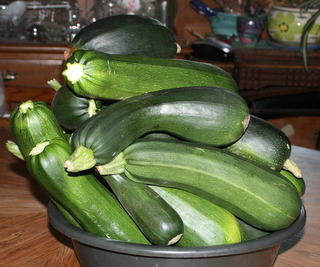
This is a tale of two zucchinis. To tell the tale, you first have to learn how to spell zucchinis, which no matter how many “c”s or “n”s you put in there, just looks wrong. But that’s not part of the story. Actually, the story is kind of long, so if you want to continue, I will give you the option to click on the more button.
An Angelica flower appears to be a 4th of July fireworks celebration!
Need we say more?
Conflicting demands of population growth, agriculture, and environmental needs (endangered salmon and other fish) are putting a huge strain on our water supply. Setting up a system to collect rainwater is easy and inexpensive and can not only get you through the dry spells, but leave precious water for other uses.
Despite the cold spring here in the Pacific Northwest, the garlic has been thriving! We got everything weeded over the weekend and thoroughly watered. You can almost feel them reaching upward, waiting for that promised sunshine! As you can see from the photos, I planted the garlic rather densely in beds (4 rows/bed) this year, … Read more